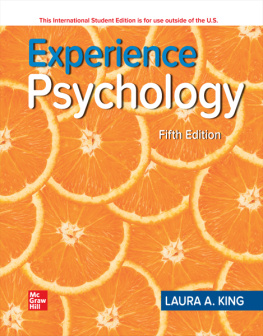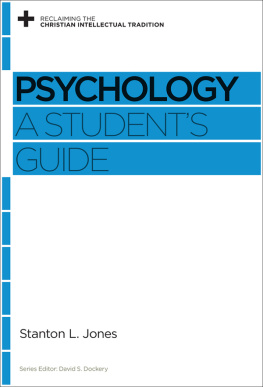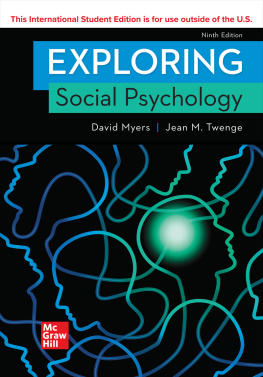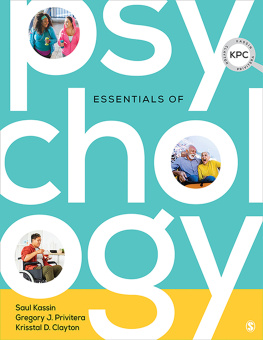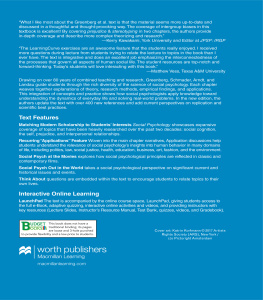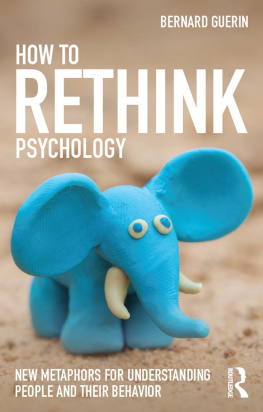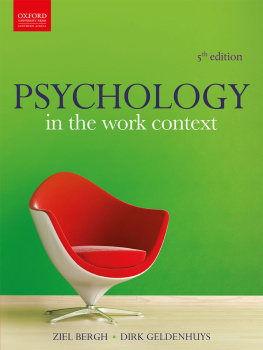
Page i
Experience
Psychology
Fifth Edition
LAURA A. KING
University of Missouri, Columbia

Page ii

EXPERIENCE PSYCHOLOGY
Published by McGraw Hill LLC, 1325 Avenue of the Americas, New York, NY 10019. Copyright 2022 by McGraw Hill LLC. All rights reserved. Printed in the United States of America. No part of this publication may be reproduced or distributed in any form or by any means, or stored in a database or retrieval system, without the prior written consent of McGraw Hill LLC, including, but not limited to, in any network or other electronic storage or transmission, or broadcast for distance learning.
Some ancillaries, including electronic and print components, may not be available to customers outside the United States.
This book is printed on acid-free paper.
1 2 3 4 5 6 7 8 9 LWI 26 25 24 23 22 21
ISBN 978-1-266-13819-5
MHID 1-266-13819-6
Cover Image: Dimitris66/Getty Images
All credits appearing on page or at the end of the book are considered to be an extension of the
copyright page.
The Internet addresses listed in the text were accurate at the time of publication. The inclusion of a website does not indicate an endorsement by the authors or McGraw Hill LLC, and McGraw Hill LLC does not guarantee the accuracy of the information presented at these sites.
mheducation.com/highered
Page iii
about the author

Courtesy Lisa Jensen
Laura A. King
Laura King did her undergraduate work at Kenyon College, where she began studying toward an English major. In the second semester of her junior year, she declared a second major in psychology. She completed her A.B. in English with high honors and distinction and in psychology with distinction in 1986. Laura then did graduate work at Michigan State University and the University of California, Davis, receiving her Ph.D. in personality psychology in 1991.
Laura began her career at Southern Methodist University (SMU) in Dallas, moving to the University of Missouri in 2001, where she is now a Curators Distinguished Professor of Psychology. In addition to seminars in the development of character, social psychology, and personality psychology, she has taught undergraduate lecture courses in introductory psychology, introduction to personality psychology, social psychology, and the Art and Science of Living. She has also taught the Psychology of the Good Life for the community at large. At SMU, she received six different teaching awards, including the M award for sustained excellence in 1999. At the University of Missouri, she received the Chancellors Award for Outstanding Research and Creative Activity in 2004.
Her research, which has been funded by the National Institute of Mental Health and the National Science Foundation, has focused on a variety of topics relevant to the question of what it is that makes for a good life. She has studied goals, life stories, happiness, well-being, and meaning in life. In general, her work reflects an enduring interest in understanding what is good and healthy in people.
She has published over 100 articles and chapters (typically with graduate and undergraduate student collaborators). She received the Carol and Ed Diener Award for Distinguished Contributions to Personality in 2011; the award for Distinguished Service to SPSP in 2015; and the 2018 Jack Block Award for Distinguished Research in Personality Psychology, the highest honor in her field. She was elected President of the Society for Personality and Social Psychology in 2021. Laura has served as editor or associate editor for a number of journals and was the first woman to edit the Journal of Personality and Social Psychology: Personality Processes and Individual Differences, the top outlet in personality and social psychology.
In real life, Laura is an accomplished cook and enjoys listening to music (mostly jazz vocalists and singer-songwriters), running with her faithful dog John, and learning about advanced calculus from her son, Sam.
Page iv
For Sam

Page v
U.S.
brief contents

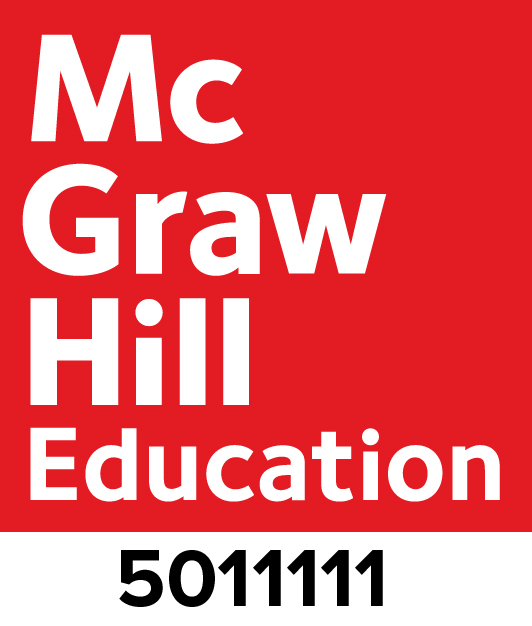
Page vi
contents
Page vii
Page viii
Page ix
Page x
Page xi

Page xii
guide to diversity, equity, and inclusion
Throughout the text, numerous changes have been made to provide more inclusive language and more diverse examples when discussing human groupsincluding those based on gender, gender identity, sexuality, disability status, veteran status, immigrant status, and religious faith. New photos for the fifth edition were chosen to ensure representation of the broad range of people who are of interest to psychologists, including stigmatized groups such as people with overweight, people with disabilities, and people of gender and sexual minorities. In addition, we strived to include images that show people of different backgrounds interacting in nonstereotypical ways, such as white people being helpful to Black people. The fifth edition revision was completed with an emphasis on combating anti-Black racism and ensuring that all studentsregardless of gender, gender identity, sexual orientation, religious faith, disability status, immigrant status, indigenous identities, socioeconomic status, military veteran statuswould recognize themselves in Experience Psychology .
Chapter 1 The Science of Psychology
Example of forgiveness drawn from the Amish was replaced with civil rights hero John Lewis, and it includes a description of the man who beat Lewis and his statements about his own racist views.
Challenge Your Thinking: Where Is Everybody? confronts the lack of diversity in the history of psychology, as well as in contemporary science (Roberts & others, 2020). Scholars who are highlighted include Mary Whiton Caulkins, Henry Turner, and Inez Beverly Prosser. The feature box notes that to address the pressing problems facing psychology we need everyone included in the conversationregardless of not only race and gender but disability status, gender identity, and sexual orientation.
Psychology in Our World: Big Data in Psychological Science reviews the ways big data has been used to measure racism and health disparities and to estimate the number of sexual and gender minority people.
A summary is provided on research (Biswas-Diener & others, 2005) into happiness in groups of people not generally included in psychological studiesInughuits, Maasai, and Old Order Amish.
The concept of WEIRD samples is introduced and defined .
The section on values in psychological research focuses on the example of research on gay and lesbian parents (Farr & others, 2019, 2020).
Next page
